Centers For Medicare & Medicaid Services Creates New Hospital Inpatient Payment for Coronary Intravascular Lithotripsy
- None.
- None.
Insights
Analyzing...
Three New IVL-Specific Diagnostic Related Groups (DRGs) with Increased Payments Go Into Effect October 1, 2023
SANTA CLARA, Calif., Aug. 02, 2023 (GLOBE NEWSWIRE) -- Shockwave Medical, Inc. (NASDAQ: SWAV), a pioneer in the development and commercialization of transformational technologies for the treatment of cardiovascular disease, announced today that as part of the Fiscal Year 2024 Medicare Hospital Inpatient Prospective Payment System (IPPS) final rule, the Centers for Medicare & Medicaid Services (CMS) has created new Medicare Severity Diagnosis Related Group (MS-DRG) codes and payments for coronary Intravascular Lithotripsy (IVL) in the hospital inpatient setting. The new MS-DRG codes and payments will become effective October 1, 2023.
Three new codes, MS-DRGs 323, 324, and 325, have been created to describe Percutaneous Coronary Interventions (PCI) that utilize coronary IVL, with and without a stent implant (intraluminal device), in the hospital inpatient setting. The new coronary IVL-specific MS-DRGs are associated with higher payments than the MS-DRG payments for other Percutaneous Coronary Intervention (PCI) procedures.
The relevant codes are as follows:
| MS-DRG | Descriptor | Payment2 |
| 323 | Coronary Intravascular Lithotripsy with Intraluminal Device with MCC1 | |
| 324 | Coronary Intravascular Lithotripsy with Intraluminal Device without MCC1 | |
| 325 | Coronary Intravascular Lithotripsy without Intraluminal Device without CC/MCC1 |
1 MCC: Major Complications and Comorbidities; CC: Complications and Comorbidities.
2 CMS-1785-F; National Average MS-DRG rates shown are based on Medicare Inpatient Prospective Payment System FY2024 Final Rule, National average payment rates assume full update amount for hospitals which have submitted quality data and hospitals have a wage index greater than 1. Site specific payment rates will vary based on regional area wage differences, teaching hospital status, indirect medical education costs, quality data, additional payments to hospitals that treat a large percentage of low income patients (“disproportionate share payments”), etc.
To date, hospitals in the U.S. have been reimbursed for coronary IVL via a New Technology Add-On Payment (NTAP), which provides an incremental payment of up to
"We appreciate CMS' decision to create new MS-DRGs for coronary IVL. We believe these new MS-DRGs, which are the first new additions in the field of PCI in over 20 years, will help ensure access to the safe and effective benefits of Shockwave IVL for patients suffering from complex, calcified coronary artery disease," said Robert Fletcher, Senior Vice President of Marketing and Market Access at Shockwave Medical. "Having appropriate reimbursement for hospitals is key to ensuring that physicians are able to choose the optimal calcium modification strategy for patients undergoing a PCI. We would like to acknowledge CMS for their thorough evaluation of the NTAP program for coronary IVL and for their thoughtful conclusion on a permanent reimbursement structure.”
About Shockwave Medical, Inc.
Shockwave Medical is a leader in the development and commercialization of novel technologies that transform the care of underserved patients with cardiovascular disease. Its first-of-its-kind Intravascular Lithotripsy (IVL) technology has revolutionized the way calcium is managed during the treatment of atherosclerotic cardiovascular disease by safely using sonic pressure waves to disrupt challenging calcified plaque, resulting in significantly improved patient outcomes. Through the recent acquisition of the Reducer, which is under clinical investigation in the U.S. and is CE Marked in the EU and UK, Shockwave Medical plans to introduce its second transformative technology to the interventional cardiology community. By redistributing blood flow within the heart, the Reducer is designed to provide relief to the millions of patients worldwide suffering from refractory angina who have no other treatment options. Learn more at www.shockwavemedical.com and www.neovasc.com.
Forward-Looking Statements
This press release contains statements relating to our expectations, activities, programs, goals, events or developments that we expect, believe or anticipate will or may occur, which are “forward-looking statements” within the meaning of the Private Securities Litigation Reform Act of 1995. All statements, other than statements of historical facts, are statements that could be deemed forward-looking. In some cases, you can identify these statements by forward-looking words such as “may,” “might,” “will,” “should,” “expects,” “plans,” “anticipates,” “believes,” “estimates,” “predicts,” “potential,” or “continue,” and similar expressions, and the negative of these terms. You are cautioned not to place undue reliance on these forward-looking statements. Forward-looking statements are only predictions based on our current plans, expectations, estimates, and assumptions, valid only as of the date they are made, and subject to risks and uncertainties, some of which we are not currently aware.
Important factors that could cause our actual results to differ materially from those indicated in the forward-looking statements include, among others: risks and uncertainties related to use and reimbursement of our products. These factors, as well as others, are discussed in our filings with the Securities and Exchange Commission (SEC), including in Part I, Item IA - Risk Factors in our most recent Annual Report on Form 10-K filed with the SEC, and in our other periodic and other reports filed with the SEC. Except to the extent required by law, we do not undertake to update any of these forward-looking statements after the date hereof to conform these statements to actual results or revised expectations.
Media Contact:
Scott Shadiow
+1.317.432.9210
sshadiow@shockwavemedical.com
Investor Contact:
Debbie Kaster
dkaster@shockwavemedical.com








